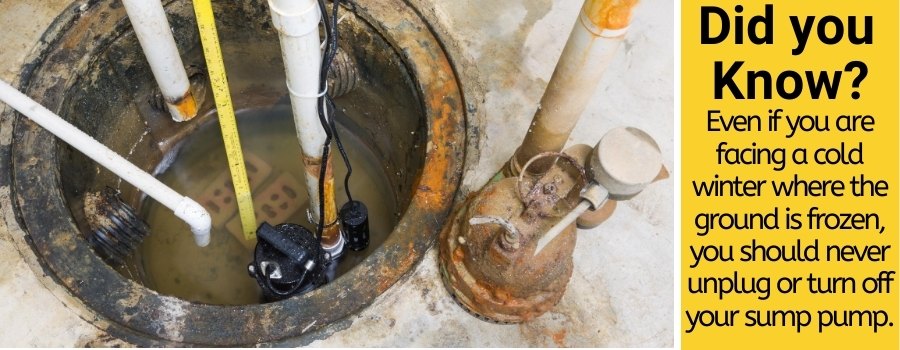Why Does My Sump Pump Run In The Winter?

Why Does My Sump Pump Run in the Winter?
As winter approaches, it's not uncommon for homeowners to ask themselves, "Why does my sump pump run in the winter?" It's a valid question, as sump pumps typically don't see much action during the winter months. Beforehand, you should make sure you understand what a sump pump is and why it's important.
A sump pump is used to remove and dispose of excess water that collects in your basement. It is typically installed at the lowest point of your basement or crawlspace, and it works by pumping the water out of the area and away from your home and into a drainage system.
What Causes a Sump Pump to Run in the Winter?
Though most sump pumps don't necessarily need to be running all winter, some may start operating during this time of year due to a few different reasons. The most common causes of a sump pump running in the winter include the following:
- Surface Water Inflow: Surface water can build up around and infiltrate your basement or crawlspace during rainstorms or snowmelt. This means that the sump pump needs to work in order to remove and dispose of the water.
- Groundwater Inflow: Groundwater can also seep into the basement or crawlspace due to higher water tables. This means that the sump pump needs to work in order to remove and dispose of the water.
- Warn Weather: In some cases, the milder winter weather can cause the water table to rise. This, in turn, will make it more likely that your sump pump will need to run, as it will have to dispose of more water.
- Plumbing Leaks: Even when these aren't visible, plumbing leaks can cause excess water to collect in the basement or crawl space. This may require your sump pump to be running in order to effectively dispose of the water.
Can I Prevent My Sump Pump From Running in the Winter?
If you want to ensure that your sump pump is running as efficiently and effectively as possible, there are some steps you can take to help prevent it from running during the winter. Here are a few suggestions:
- Install A Backflow Prevention Valve: A backflow prevention valve helps to prevent water from being drawn from outside sources into your basement or crawl space. This can be a great way to prevent water from collecting in your basement and help to avoid the need for the sump pump running.
- Clear Gutters and Drains: If your gutters and drains are blocked by debris from the fall, this could cause water to back up and collect in your basement. Regularly clearing out gutters can help reduce the likelihood of water building up and needing to be pumped out.
- Fix any Leaks: Any pipes or plumbing fixtures that are leaking should be fixed as soon as possible. This will minimize the amount of water that needs to be disposed of and can help keep the sump pump from running.
- Perform Regular Maintenance: Sump pumps need to be regularly maintained in order to ensure they are in good working condition. Failure to do this can result in the sump pump not working properly, and this can result in excess water that needs to be pumped out.
Conclusion
Understanding why your sump pump runs in the winter can help you to take the necessary steps to ensure it is working properly and efficiently. If you are still having issues with your sump pump after taking the above steps, it may be time to call a professional to have it serviced or replaced.
There's no denying the importance of sump pumps, and understanding why your sump pump runs in the winter is an essential part of ensuring it works properly and efficiently. Taking the steps outlined above can help you to keep your sump pump running smoothly, and can help you avoid potential problems down the road.
Post a Comment for "Why Does My Sump Pump Run In The Winter?"